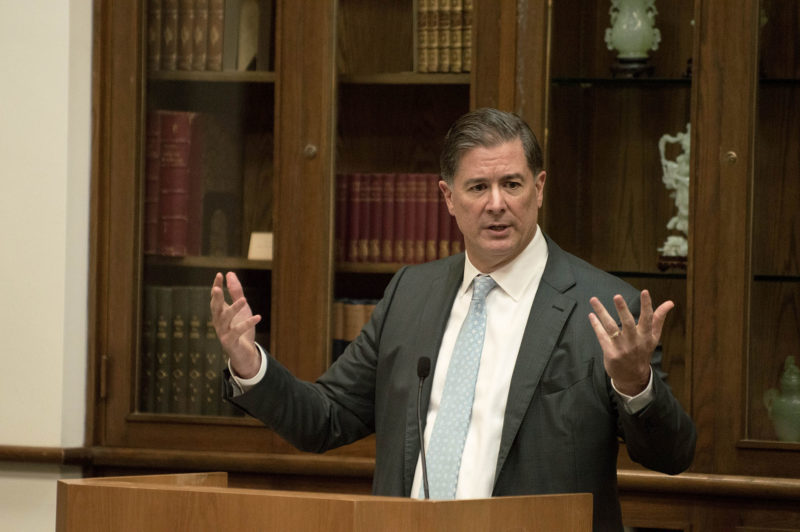David Lesch, Ewing Halsell distinguished professor of history at Trinity, discussed his personal relationship with Bashar al-Assad “” Syria’s head of state “” and his work with the Syrian refugee crisis in a Nov. 9 lecture in the Chapman Great Hall.
Lesch has authored several books on Al-Assad and done extensive research over the Middle East and Syria in particular.
“We are speaking about Syria and its tragedy. It’s a beautiful country, with a beautiful people, with unparalleled historical treasures many of which have been destroyed. And it’s just a very very sad story,” Lesch said. “Estimates have ranged from 400,000″“500,000 people have been killed since revolution began. Half the country, about 22″“23 million people, is internally or externally displaced.”
The event was organized by The Contemporary, a student-run online publication that focuses on public affairs and is dedicated to spreading global awareness through political writing. The Contemporary reached out to the World Affairs Council, an education nonprofit that helps to bring San Antonio into the global community, to help run the event. Ron Nirenberg, mayor of San Antonio and Trinity alumnus, introduced Lesch.
Other audience members included World Affairs Council members, such as Joseph Seiter, a Swiss man with global experience.
“I’d certainly like to learn [about the Syrian conflict],” Seiter said. “It is very important to connect to the world.”
Josephine Van Houten, sophomore and managing editor of The Contemporary, explained why the publication hosted this lecture.
“The Contemporary and the World Affairs Council are very similar in that The Contemporary is about politics, but we mainly foster that for students, and the World Affairs Councils is mostly for the outside, general public,” Van Houten said.
The lecture started off on a serious note, as Lesch emphasised the drastic and continuing turmoil within the country. Lesch was very involved with both the citizen opposition and the Syrian government, describing how he had friends on both sides who lost their lives. After events in Syria escalated to extreme violence, Lesch was no longer allowed to visit al-Assad, so Lesch and his team began a project to interview the opposition soldiers, an issue he felt people were ignoring.
“We were there for three or four days because we only planned to talk to four [opposition fighters]. … It was one of the most exhausting experiences of my life,” Lesch said. “They would call up their buddies and say, “˜Hey, these guys are serious, they’re actually listening to us.’ Because the European and U.S. governments are not listening to the actual fighters.”
Lesch went on to describe how desperate these soldiers had become. Though the soldiers expected the government to fall when they first rose up and anticipated Western aid, neither occurred. Instead, they found a bloody, drawn-out war.
“One guy, symbolic of the change in Syria on a personal level, was a pediatrician before the war,” Lesch said. “I asked this man, “˜What’s going to happen to the 10 percent Alawites if you win the war?’ His message was he didn’t care what religion they are; they were the enemy and we was going to kill them. He went from saving lives to killing someone.”
Lesch described how the conflict developed due to many miscalculations, focusing on how all of the soldiers wouldn’t have started this war if they had known the toll it took, and all they needed to stop was any form of concession from al-Assad.
Lesch believes al-Assad was the hope of the West in the Middle East, but Lesch saw how power and the Syrian Old Guard corrupted al-Assad, turning him into just another dictator.
Lesch closed by repeating what a communist opposition soldier told him when he asked him why he was fighting: “I have found my voice.” These profound words impacted Lesch, who believes that the pain and horror of the Syrian war could start to end if only al-Assad could hear that voice, too.







